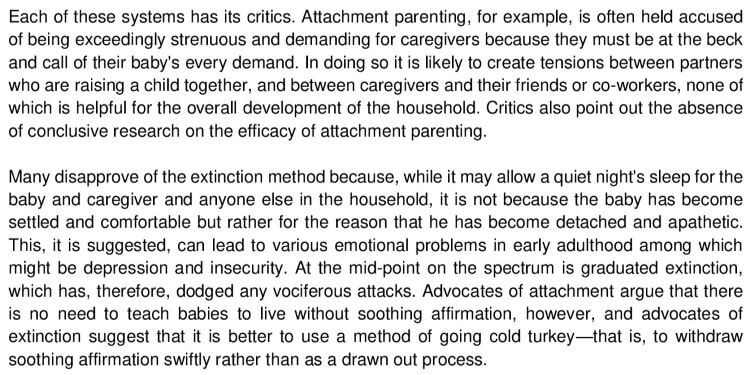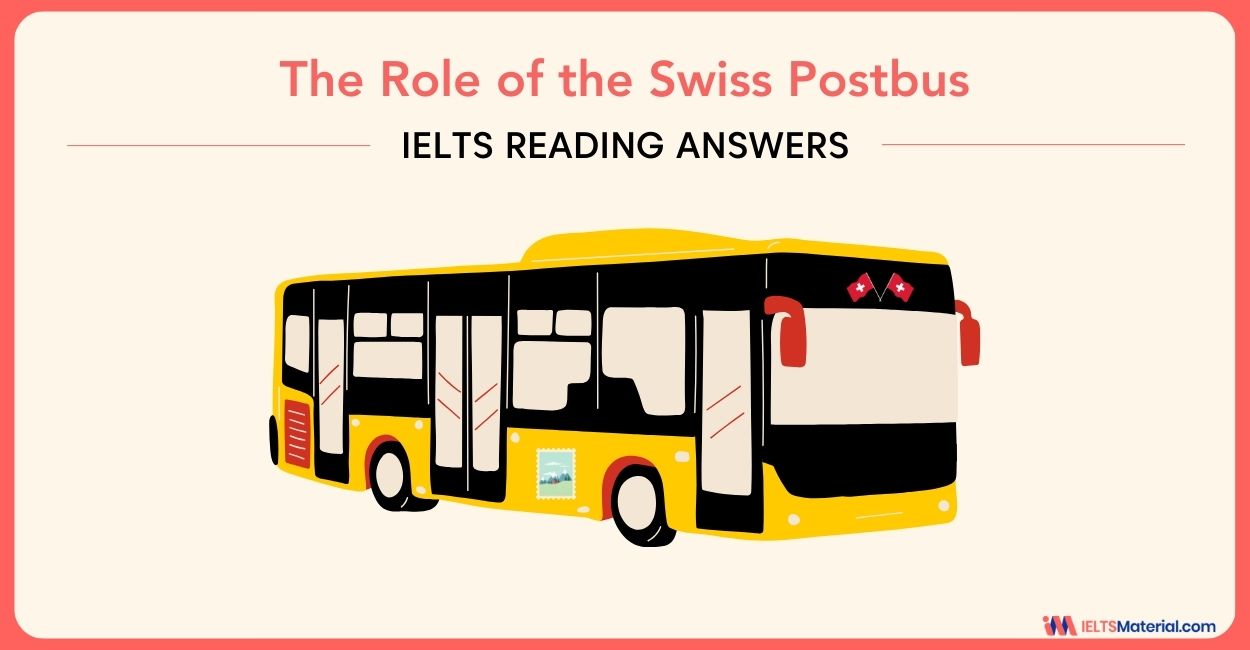Good Parenting IELTS Reading Answers
9 min read
Updated On
-
Copy link
Table of Contents

Limited-Time Offer : Access a FREE 10-Day IELTS Study Plan!
Good Parenting IELTS Reading Answers, is a IELTS Academic Reading passage that consists of 13 questions.
With diligent practice, the Reading Module can be the top-scoring category for IELTS aspirants. To score well, you must understand how to approach and answer the different question types in the Reading Module.
The question types found in this IELTS Reading passage are:
- Reading Sentence Completion(Q. 27 – 30)
- Reading Matching features (Q.31 – 35)
- Note Completion (Q.36 – 40)
Reading Passage
| You should spend about 20 minutes on Questions 27 – 40, which are based on the Reading Passage below. |
Good Parenting


Questions 27-30
Complete the sentences below with words taken from Reading Passage 3. Use NO MORE THAN TWO WORDS for each answer.
Write your answers in boxes 27-30 on your answer sheet.
27 The phrase ‘attachment parenting’ was invented by a ….
28 The principles of attachment parenting are derived from the discipline of……..
29 The key points of the ‘extinction’ school of thought originated from the work of……..
30 Dr. Ferber initially thought the parent should not spend the night with the child but now thinks
….. is all right.
Questions 31-35
Look at the following statements (Questions 31-35) and the methods in the box below. Match each statement with the correct parenting method A—C.
Write the appropriate letter A—C in boxes 31-35 on your answer sheet.
NB You may use any letter more than once
31 After a strict bedtime schedule, the child is unattended till morning.
32 All crying is a vocalization of important needs.
33 Caregiver presence as the child drifts to sleep should decrease over time.
34 The emphasis is on the physical closeness between baby and caregiver at any time.
35 Well-fed babies should sleep through the night.
List of Parenting Methods
A attachment parenting
B extinction
C graduated extinction
Questions 36-40
Complete the notes below.
Choose NO MORE THAN TWO WORDS from the passage for each answer. Write your answers in boxes 36-40 on your answer sheet.
Attachment Parenting
very stressful as parents have to give in to 36……. of the baby
but not yet any
37 ….. to show that it works
Extinction Method
a good night’s sleep is attained by family members because the baby is 38….. and but can lead to
39 ………………such as despair & unhappiness later in life
Graduated Extinction
a central position so 40 …. have been avoided
Book a FREE Online Webinar with Our IELTS Experts to Learn More Tips and Techniques for IELTS Reading!
Good Parenting IELTS Reading Answers With Explanation
27 Answer: PAEDIATRICIAN
Question type: Sentence completion
Answer location: Paragraph 2, the introductory line
Answer explanation: “Attachment parenting, a term coined by pediatrician William Sears, suggests that children form powerful emotional bonds with caregivers during early childhood that have implications for their development through life.” This suggests that the concept of Attachment Parenting was suggested by William Sears, a pediatrician.
28 Answer: DEVELOPMENTAL PSYCHOLOGY
Question type: Sentence completion
Answer location: Paragraph 3, lines 3-6
Answer explanation: “The basis for this theory was generated within the field of developmental psychology during the 1950s when researcher John Bowlby proposed that maternal deprivation during infancy could decrease a person’s ability to form healthy adult relationships years later.” This suggests that the theory of attachment parenting has been extracted from the field of developmental psychology.
29 Answer: ( EMMETT ) HOLT
Question type: Sentence completion
Answer location: Paragraph 3, lines 3-6
Answer explanation: “The core postulates of this approach were laid down by Emmett Holt but they have been extrapolated upon by authors such as Warwick Reilly and further adapted recently by Melinda Collins to form the extinction method of today.” This suggests that Emmett Holt was the key player to derive the points of Extinction Parenting.
30 Answer: CO-SLEEPING
Question type: Sentence completion
Answer location: Paragraph 4, lines 10-12
Answer explanation: “Ferber has since altered his stance to acknowledge the acceptability of co-sleeping and suggests that there is no single method or golden rule for overcoming sleep difficulties.” This suggests that although Ferber was of the belief that parents shouldn’t have to sleep with their kids in the process of Graduated Extinction Parenting, he acknowledged that co-sleeping is fine.
31 Answer: B
Question type: Matching features
Answer location: Paragraph 3, lines 5-8
Answer explanation: “Caregivers are encouraged to develop a gentle evening routine that involves feeding 45 minutes before bed, bathing, dressing and laying the baby in his sleeping sack, walking out and closing the door, and remaining out of the child’s presence until dawn even if he cries for extended periods of time.” This suggests that as per the extinction theory of parenting, it is ok to leave the baby unattended after following its dietary and sleeping schedule till it wakes up in the morning.
32 Answer: A
Question type: Matching features
Answer location: Paragraph 2, lines 8-12
Answer explanation: “Attachment parenting also suggests that babies’ ability to communicate their requirements is limited to crying and that parents need to learn to understand different types of crying signals. No crying is considered superfluous — even if the baby merely wants to be comforted rather than fall asleep —caregivers are encouraged to affirm these desires.” This suggests that in Attachment Parenting each and every cry of the baby should be well-attended to.
33 Answer: C
Question type: Matching features
Answer location: Paragraph 4, first five lines
Answer explanation: “Graduated extinction is a modulated version of the extinction method. It postulates that a process of learning needs to be undertaken in order for children to sleep through the night. Richard Ferber, the doctor who popularized this method in the 1980s, emphasized the progressive withdrawal of the caregiver’s company with the child in bed as a way to solve infant sleep problems.” This suggests that the baby needs to be given less attention by following the series of withdrawals and retreats.
34 Answer: A
Question type: Matching features
Answer location: Paragraph 2, lines 6-8
Answer explanation: “Attachment parenting seeks to avoid this tendency by placing great importance on childhood bonding through the caregiver’s holding and cuddling her baby when he is upset.” This states that Attachment Parenting advocates for close proximity with the baby and keen attention to the baby’s demands.
35 Answer: B
Question type: Matching features
Answer location: Paragraph 3, introductory lines
Answer explanation: “The extinction method proposes that, so long as a baby has had adequate calorie intake during the day, he or she can reasonably be expected to maintain nocturnal somnolence.” This suggests that as per the Extinction Theory of parenting, the baby is expected to sleep after it is adequately fed.
36 Answer: EVERY DEMAND
Question type: Notes completion
Answer location: Paragraph 5, first three lines
Answer explanation: “Each of these systems has its critics. Attachment parenting, for example, is often held accused of being exceedingly strenuous and demanding for caregivers because they must be at the beck and call of their baby’s every demand.” This suggests that parents need to be present at every demand of the baby.
37 Answer: CONCLUSIVE RESEARCH
Question type: Notes completion
Answer location: Paragraph 5, last lines
Answer explanation: “ Critics also point out the absence of conclusive research behind the efficacy of attachment parenting.” This suggests that there is no conclusive or plausible research that holds the practicality of attachment parenting.
38 Answer: DETACHED ( AND ) APATHETIC
Question type: Notes completion
Answer location: Paragraph 6. First three lines
Answer explanation: “Many disapprove of the extinction method because, while it may allow a quiet night’s sleep for baby and caregiver and anyone else in the household, it is not because the baby has become settled and comfortable but rather for the reason that he has become detached and apathetic.” This suggests that the baby could be driven detached and apathetic in the princess of extinction parenting.
39 Answer: EMOTIONAL PROBLEMS
Question type: Notes completion
Answer location: Paragraph 6, lines 4-5
Answer explanation: “This, it is suggested, can lead to various emotional problems in early adulthood among which might be depression and insecurity.” This emphasizes the point that a baby is vulnerable in case its cries and calls/demands are left unattended. This parenting may lead the baby to grow insensitive and hence may have emotional problems in the future.
40 Answer: VOCIFEROUS ATTACKS
Question type: Notes completion
Answer location: Paragraph 6, lines 5-6
Answer explanation: “At the mid-point on the spectrum is graduated extinction, which has, therefore, dodged any vociferous attacks.” This suggests that the Graduate Extinction way of parenting reduces the chances of being vociferously attacked by the critics as it provides a mid-way of parenting.
Want to improve your IELTS Reading score? Grab Our IELTS Reading Ebook Today!
Tips for Answering the Question Types in the Good Parenting Reading Passage
Let us check out some quick tips to answer the types of questions in the ‘Good Parenting’ Reading passage.
IELTS Reading: Sentence Completion
Sentence Completion questions require you to fill in gaps in sentences based on information from the passage. This task tests your ability to identify key details and paraphrase information accurately.
- Read Instructions Carefully: Pay attention to the word limit for each answer.
- Identify Keywords: Highlight key terms in the sentences to find related information in the passage.
- Skim the Passage: Get an overview of the text to understand the main ideas and context.
- Look for Synonyms: Be prepared to find synonyms or paraphrases in the passage that fit the sentences.
- Check Your Answers: Ensure that your completed sentences make sense and fit grammatically.
IELTS Reading: Matching Features
Matching Features questions ask you to pair statements with corresponding options found in the passage. This type assesses your understanding of relationships between different pieces of information.
- Read Instructions Carefully: Understand what features you need to match (e.g., names, dates).
- Highlight Keywords: Mark important terms in both the statements and the options.
- Skim and Scan: Skim the passage for the general structure and scan for specific details.
- Understand Context: Read the surrounding text to grasp the full meaning of keywords.
- Eliminate Incorrect Options: Use the process of elimination to rule out options that don’t match.
IELTS Reading: Note Completion
Note Completion involves filling in blanks in a set of notes using information from the passage. This exercise helps gauge your ability to extract specific details while maintaining clarity and accuracy in your responses.
- Read Instructions Carefully: Note the word limit for each gap (e.g., “No more than two words”).
- Identify Keywords: Highlight key phrases in the notes that need to be filled in.
- Skim for Main Ideas: Skim the passage to understand its main ideas and themes.
- Use Context Clues: Read nearby sentences for context to help determine the correct words or phrases.
- Check Spelling and Grammar: Ensure your answers are spelled correctly and fit grammatically within the notes.
Also check:
- IELTS Reading Tips and Techniques to Increase your Reading Speed
- How to Do Short Answer Type of Questions in IELTS Reading? | IELTSMaterial.com
- Emigration to the US, How bugs hitch-hike across the galaxy, Finding out about the world from television news – Reading Answers
- What Cookbooks Really Teach Us, Is There More To Video Games Than People Realize?, Seed Vault Guards Resources For The Future – IELTS Reading Answers
- The Loch Ness Monster, Co- Educational Versus Single Sex Classrooms – IELTS Reading Answers

Start Preparing for IELTS: Get Your 10-Day Study Plan Today!
Recent Articles

Kasturika Samanta


Kasturika Samanta





Post your Comments